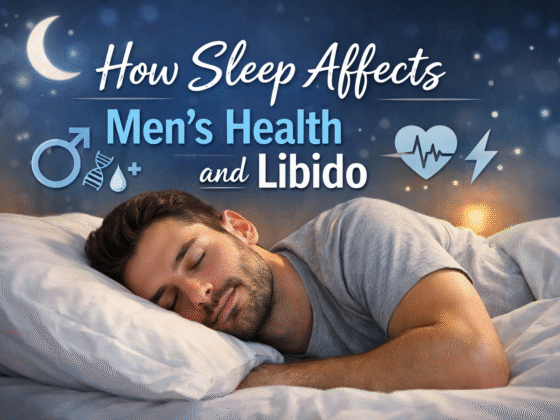Last Updated on 18th September 2025 by Charlie Walsh
Let’s rip the plaster off this one: cheating is messy. Whether you’re the one doing it or the one finding out about it, it’s rarely just a harmless little mistake, it’s emotional dynamite. And sometimes, that emotional chaos doesn’t just stay in your head, it shows up in your body. Specifically, below the belt.
So, can cheating cause erectile dysfunction? It’s a fair question. You’re not alone if you’ve noticed a drop in performance around the same time things got rocky in your relationship. Let’s get into what’s going on, what science (and psychologists) say, and what you can actually do about it.
What Is Erectile Dysfunction?
Erectile dysfunction (ED) isn’t just about not getting it up once in a while. That happens to everyone, even the ones who swear it never does. ED is when it’s happening consistently, and it starts affecting your confidence, your relationships, or your ability to have satisfying sex.
Psychological Factors That Influence ED
Sure, physical causes like poor blood flow or low testosterone are part of the picture. But ED isn’t always about plumbing, sometimes it’s about wiring. Stress, anxiety, depression, and—you guessed it—relationship problems can all lead to or worsen erectile dysfunction.
Now enter: guilt, shame, and betrayal. These are often the first signs of cheating, and they don’t just affect your mind, they can hit your body too. Which brings us to…
The Psychological Impact of Cheating
Cheating isn’t always about sex. Sometimes it’s about escape, self-sabotage, or reacting to something missing in the relationship. But regardless of the reason, it can seriously mess with your mental state. And when your brain’s in chaos, your body’s likely to follow.
Emotional Stress and Guilt
If you’ve cheated and feel guilty, your brain is already working overtime. Guilt eats away at your focus, your sense of self-worth, and yes, your ability to get and maintain an erection. It’s hard to feel confident or sexy when you’re mentally dragging yourself through the mud.
You might find yourself pulling away emotionally or physically. Or, you might feel anxious during sex, worried your partner will “know” something’s off. That kind of pressure? Not exactly a turn-on.
Relationship Conflict and Trust Issues
Even if you’re not the one who cheated, being in a relationship where trust is broken can create an undercurrent of stress. If your partner is cold, suspicious, or checking your phone, the bedroom starts feeling less like a safe space and more like a courtroom.
And let’s be honest—when sex feels like a performance review, your body tends to freeze up rather than show up.
Cheating as a Symptom vs. a Cause
This part’s worth thinking about. Sometimes cheating isn’t the cause of ED, it’s a symptom of it. For example, if you’ve been struggling with sexual performance, you might seek validation or excitement elsewhere. But, ironically, that often makes the problem worse.
On the flip side, some people start having ED after they cheat. The mental gymnastics, the secrecy, the tension—it builds up. And your body says, “Nope. Not doing this right now.”
How Cheating Affects the Cheater vs. the Partner

It’s not just the cheater who can be affected. ED can show up on either side of the betrayal.
The Cheater’s Mental Load
Carrying a secret weighs a ton. Even if you’ve convinced yourself it “didn’t mean anything,” your subconscious may not agree. You might start avoiding intimacy out of guilt, fear of being exposed, or simply because you no longer feel emotionally connected. That emotional block can translate into physical blocks, too.
The Partner’s Emotional Response
If your partner found out you cheated, and now they’re struggling with ED, that’s valid too. Betrayal can trigger intense emotional pain, even trauma. Some people lose interest in sex altogether, while others want it more, just to feel reassured. Both can lead to stress-based sexual dysfunction.
What To Do If You’re Experiencing ED After Cheating
So, what now? Whether you cheated or were cheated on, experiencing ED isn’t a life sentence. But you do need to look under the hood a bit.
Acknowledge the Root Cause
Pretending everything’s fine won’t help. If you suspect emotional turmoil is behind the bedroom issues, be honest with yourself. Ignoring it only compounds the problem.
This doesn’t mean spiraling into guilt or blame—it means recognising that emotional stress is real and affects your body.
Seek Professional Help
ED linked to emotional issues usually needs more than just a magic pill. Talking to a therapist, especially one familiar with relationship dynamics and sexual health, can be a game-changer. You don’t have to figure it out alone, and no, therapy doesn’t mean you’re broken. It means you’re sorting your sh*t out like an adult.
Rebuilding Intimacy and Trust
If your relationship is still intact, you’ll need to do some work to rebuild connection. That means open communication, honesty, and maybe a bit of awkward vulnerability. (Yeah, we know—fun.) But seriously, intimacy comes from trust. And trust is built, not bought.
It’s okay if it takes time. The important part is showing up and doing the work.
Final Thoughts
Can cheating cause erectile dysfunction? In short, yes—especially when you factor in the psychological side of things. Guilt, stress, broken trust, emotional disconnection… none of these are helpful for your sex life.
The good news is, ED doesn’t have to be permanent. Understanding what’s really going on is the first step toward fixing it.
And if you’re looking to rebuild confidence along the way, the official Bathmate penis pump store has options designed to support your physical performance—no judgment, just smart, science-backed tools.










